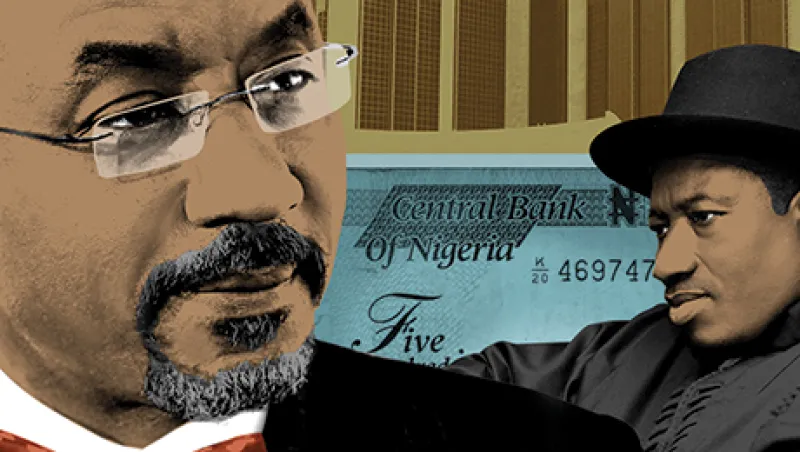Bad news keeps crashing Nigeria’s global coming-out party. The militant Islamic group Boko Haram has killed or kidnapped hundreds in the West African nation this year, Central Bank of Nigeria governor Lamido Sanusi was suspended for the rest of his term, and electricity supply has plunged so low that one local newspaper now publishes the power output daily on its front page.
The good news: With an election coming next February, the opposition All Progressives Congress party is now strong enough to field a candidate who could win. Neither the APC nor President Goodluck Jonathan’s People’s Democratic Party has settled on a ticket, but Nigerians could have two feasible choices for the first time since the start of a democratic era that began in 1999. By election day their problems may be worse, though. “We won’t see any reforms before the election,” says Bismarck Rewane, CEO of Financial Derivatives Co., an investment firm based in Lagos. New CBN governor Godwin Emefiele’s term, starting June 4, is perhaps the only big change until Nigerians go to the polls.
Sanusi took the post in 2009, after the banking sector had gorged on margin loans to local investors, who often bought bank stocks with the money. Stock prices eventually crashed. Sanusi’s CBN recapitalized lenders and nationalized three, quarantining bad assets in a special-purpose vehicle. Four bank CEOs were jailed on fraud charges, and the central bank now limits such posts to a decade. In his later years as governor, Sanusi tweaked regulations to make banks lend more to the real economy.
These efforts belonged to a period of broad-based reforms, complementing those championed by politicians such as Minister of Finance Ngozi Okonjo-Iweala and Lagos State Governor Babatunde Fashola. In April a GDP rebasing by the national statistics agency declared Nigeria’s economy to be the largest in Africa, but terrorism, a cut to fuel subsidies and the flailing power sector have hurt President Jonathan’s popularity.
Sanusi was a point of stability until Jonathan suspended him in mid-February. He kept Nigeria’s currency, the naira, in a tight trading range of about 155 to the U.S. dollar. Getting the banks to increase lending to the private sector has been harder. Nigeria doesn’t yet consolidate government cash in a single treasury account at the central bank, so public bodies use the private banks. The banks can reinvest this money in government bonds for nearly double-digit returns. Sanusi sought to change this by hiking cash reserve requirements on public sector deposits from 12 percent to 50 percent in July 2013 and to 75 percent in January 2014. As a result, the banks’ net interest margins fell by 70 basis points from 2012 to 2013, to 2.79 percent, according to Cordros Capital, a Lagos-based investment firm.
Going after lenders’ favorite economic rents could be one of the less discussed reasons that Sanusi was deposed. President Jonathan cited “financial irregularities” as cause for the governor’s suspension and objected to his public accusations of corruption at state oil company Nigerian National Petroleum Corp., which hasn’t been audited since 2005.
Sanusi’s successor, Emefiele — formerly CEO of Zenith Bank, Nigeria’s No. 2 bank by assets — could find his leadership tested by a new round of loan defaults widely expected in Lagos. Last year Nigeria privatized nearly all state electricity generation and distribution in a bid to stimulate investment. Of the $2.5 billion spent by the buyers, $2 billion came from bank loans. Power plants can’t get sufficient natural gas to meet Nigeria’s energy demands, and the national grid needs an overhaul. Some new owners won’t be able to sell enough electricity to meet loan obligations. “The central bank will have no choice but to be flexible with the banks and allow them some forbearance,” says Adebayo Adebowale, credit risk officer at United Bank for Africa, the country’s third-largest bank by assets.
A falling currency could further complicate matters. Defending the naira slashed Nigeria’s foreign exchange reserves almost 23 percent in the 12 months ended mid-May, from $48.5 billion to $37.5 billion. The country has a sovereign wealth fund, but it managed just $1 billion as of last month. “Nigeria will ultimately remain vulnerable to oil boom and bust cycles in the long-run,” according to a May research note by analyst Rele Adesina of Stanbic IBTC, the Nigerian bank owned by South Africa’s Standard Bank.
Emefiele has said that devaluing the currency would be disastrous. He may face pressure to raise interest rates, a move that Finance Minister Okonjo-Iweala has called for. “Godwin’s instinct will be not to rock the boat,” Financial Derivatives’ Rewane says. “I expect him to side with the politicians if the economy comes under pressure.”
Get more on emerging markets.





